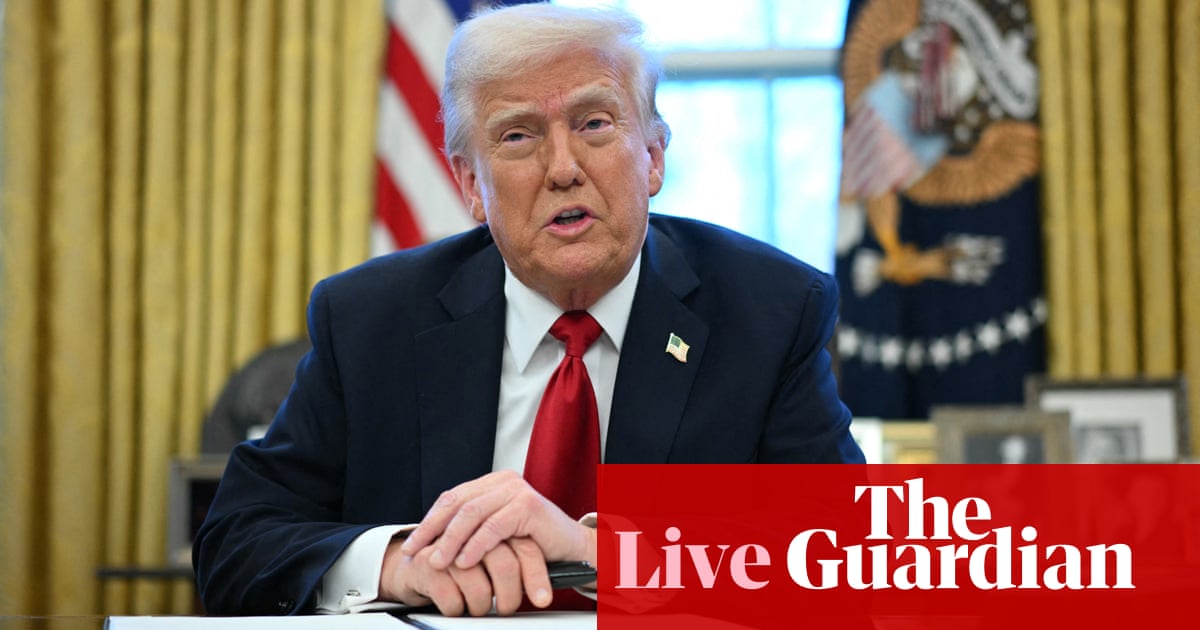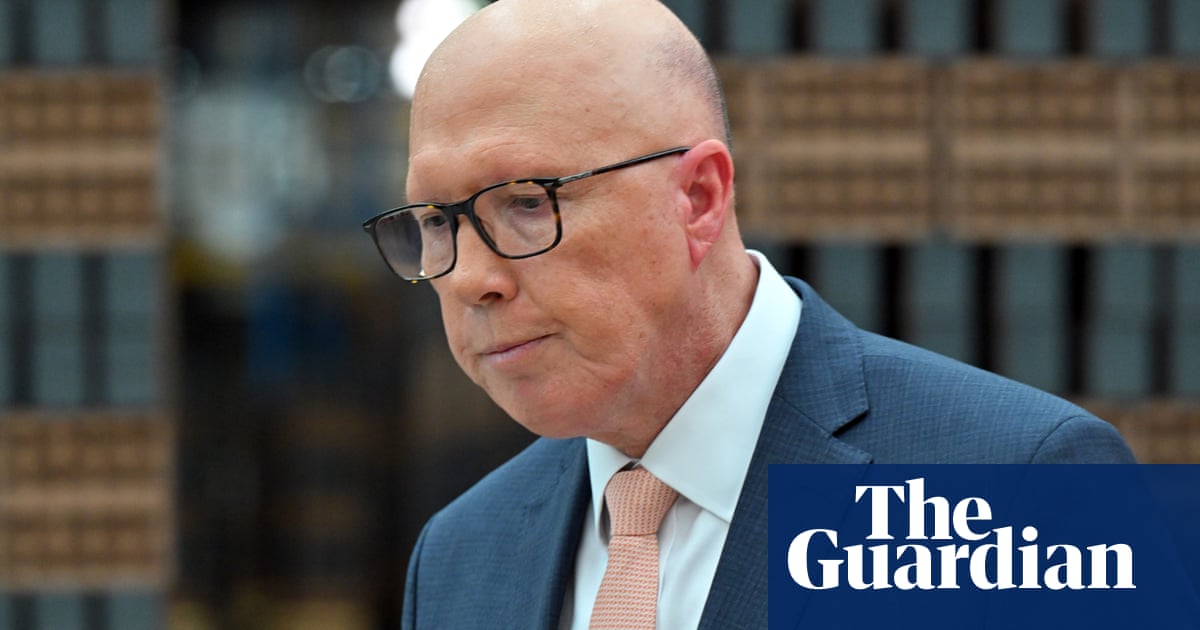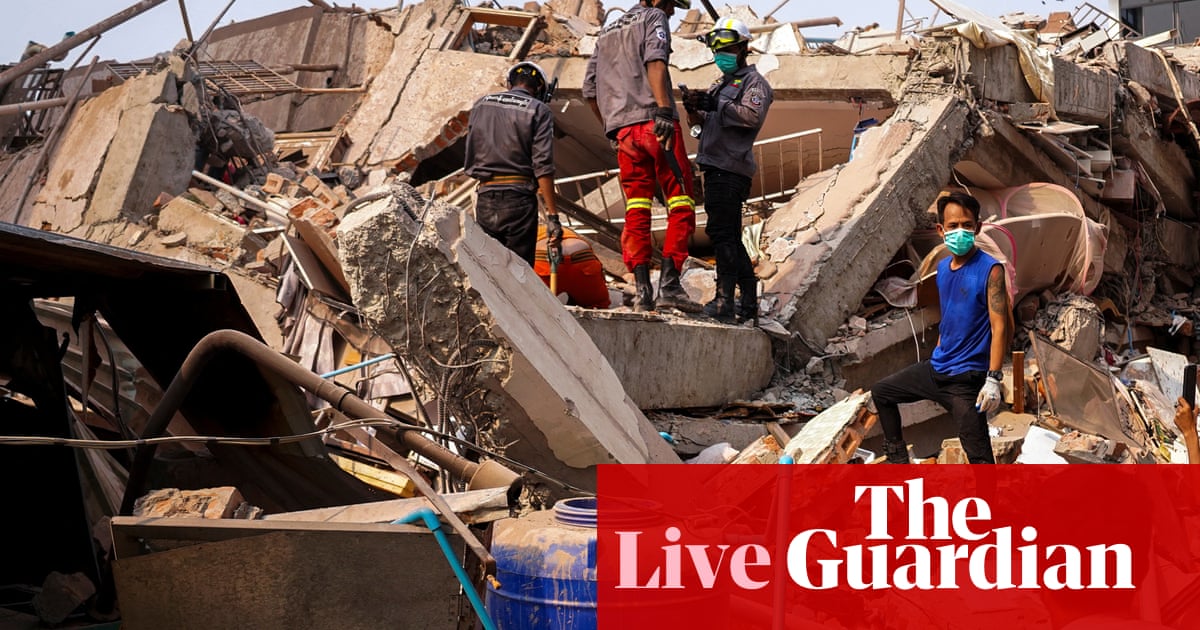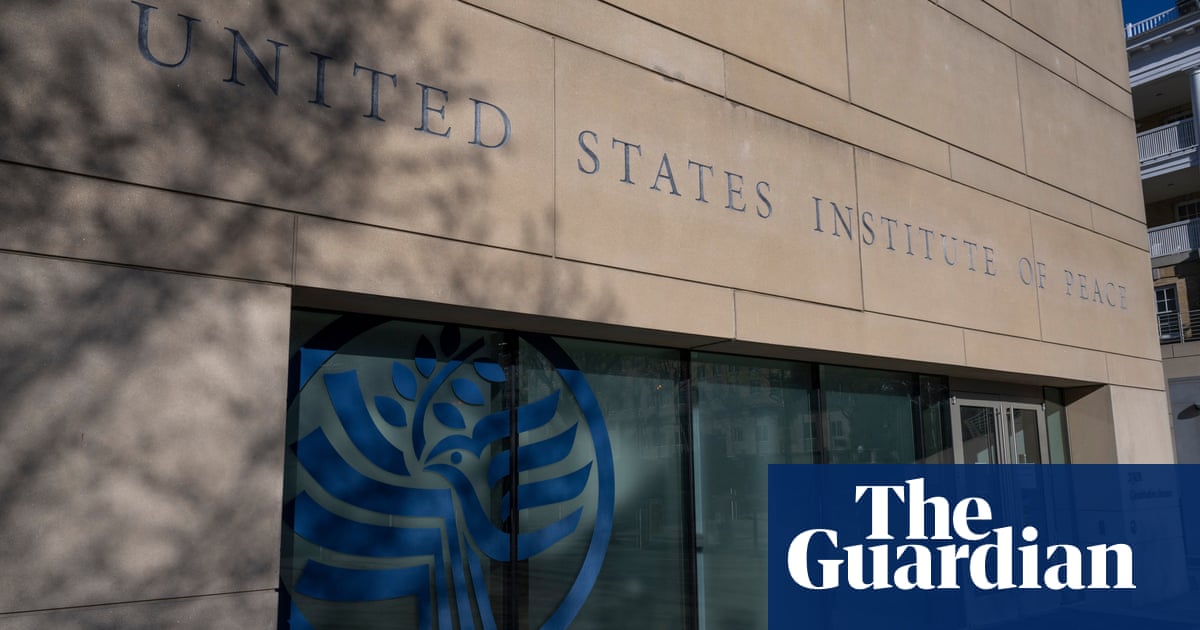Canadian leaders denounce new Trump tariffs
Speaking a few minutes ago, Canada’s prime minister, Mark Carney, called Trump’s new auto tariffs “a direct attack” on the Canadian autoworkers he had addressed earlier in the day in Windsor, Ontario, beside the Ambassador Bridge to Detroit.
Carney called the bridge “a symbol and a reality, up until now, of the tight ties between our two countries – ties of kinship, ties of commerce, ties that are in the process of being broken”.
“We will defend our workers, we will defend our companies, we will defend our country and we will defend it together”, Carney said.
Carney, the leader of Canada’s Liberal party who is campaigning for election largely on opposition to Trump’s threats to Canada, promised an autoworkers union he would create a $2bn “strategic response fund” to boost Canada’s auto sector and protect manufacturing jobs.
“President Trump is at it again,” Ontario’s conservative premier Doug Ford wrote on X. “His 25 per cent tariffs on cars and light trucks will do nothing more than increase costs for hard-working American families. U.S. markets are already on the decline as the president causes more chaos and uncertainty. He’s putting American jobs at risk. I’ve spoken with Prime Minister Carney. We agree Canada needs to stand firm, strong and united. I fully support the federal government preparing retaliatory tariffs to show that we’ll never back down.”
“Putting in peril the jobs of hundreds of thousands of auto workers in order to save the job of the secretary of defence was not on my bingo card today,” Flavio Volpe, the president of the Automotive Parts Manufacturers Association of Canada, commented.
“I have never heard something less clear or based in fact in my life. China could only dream of damaging the American auto industry so quickly and so decisively as what Trump is threatening to do here again,” he added.
Key events
Closing summary
This brings us to an end of our live coverage of another day in the life of the second Trump administration. We will be back on Thursday, but in the meantime, here is an overview of the day’s events:
-
Donald Trump, citing legally dubious national security provision, imposed 25% tariffs on cars and car parts made outside the United States, effective on 2 April.
-
Canada’s leader, Mark Carney, called Trump’s new auto tariffs “a direct attack” on Canadian autoworkers and pledged to “defend our workers”.
-
Trump suggested that he might give China “a little reduction in tariffs” if the country approves a deal to sell the US arm of TikTok to an American company.
-
Ireland braced for a hit to its economy after Trump mentioned that tariffs on Irish pharmaceuticals would be coming soon.
-
As some Republican lawmakers joined Democrats in calling for accountability over top administration officials using an insecure Signal group chat to discuss military attacks on Yemen, Trump tried to dismiss calls for an inquiry as “a witch hunt”, a strategy which has, previously, worked out for him.
-
A review of the travel schedule for Michael Waltz, the national security adviser who created the Signal group chat, shows that he was in Saudi Arabia on the day that he accidentally invited the journalist Jeffrey Goldberg to connect on Signal. If Waltz was on his personal phone when he did that, as seems likely, experts have pointed out that foreign spies could have compromised his device and followed the Signal chat in real time.
-
Democrats called on defense secretary Pete Hegseth to resign following the Signal group chat scandal.
-
Secretary of state Marco Rubio said the accidental inclusion of the Atlantic’s editor-in-chief in the Signal group chat was a “big mistake” but said that that “none of the information on there at any point threatened the operation or the lives of our service members.” That seems to be contradicted by a giant image of the texts from Hegseth, the defense secretary, who had described the exact timing of attacks, and weapons systems involved, two hours before they took place.
-
White House press secretary Karoline Leavitt confirmed that Elon Musk’s team is investigating how the Atlantic’s editor-in-chief was added to the group chat.
The US Bureau of Land Management (BLM) published its environmental assessment of an Australian company’s proposed lithium mining project in south-eastern Oregon on Wednesday, and is giving the public just four days to read the 103-page assessment and submit comments.
As Oregon Public Broadcasting reports, the Trump administration appears to be fast-tracking the proposed mine, in keeping with executive orders signed by the president calling on federal agencies like the Department of the Interior, which manages the BLM, to speed up reviews of extraction projects like mining, drilling and logging.
According to OPB: “The agency’s assessment outlines the full scope of Jindalee Resources’ plans to search the area for lithium, a highly valuable metal used in batteries. Under its subsidiary, HiTech Minerals, Jindalee aims to bore up to 800 feet into the earth across 7,200 acres in Malheur County, near the Oregon-Nevada border.”
Senator Mark Warner, a Virginia Democrat, wrote to the FBI director, Kash Patel, on Wednesday to formally request an investigation of the Signal leak.
Warner, the vice chairperson of the Senate select committee on intelligence, asked Patel to confirm that the FBI will open an investigation into the Signal group chat senior Trump administration officials used to discuss airstrikes on Houthi leaders in Yemen.
“Department of Defense policies dictate that information concerning military plans, such as contained in the messages sent by the Secretary of Defense, is classified, and no reasonable process would allow for communication of this information over a commercial messaging application before U.S. pilots had completed and safely returned from their mission,” Warner wrote.
His letter concluded:
In other contexts, the FBI has acted promptly to open an investigation when information of a similar nature has been mishandled. As you have now had two days to consider the details of this matter, can you confirm the following:
1. Will you commit to opening an investigation of this matter, if you have not already done so?
2. Will you collect the devices involved, whether government-issued or otherwise?
3. Will you scan those devices for malware or other indications of unauthorized access?
Alarm in Ireland over Trump’s threat that ‘tariffs on pharmaceuticals’ are coming
While much of the world is reacting to Donald Trump’s imposition of 25% tariffs on imported cars and car parts on Wednesday, his threat to follow that with tariffs on pharmaceuticals is front-page news in Ireland.
The main story on the home page of the Irish Times right now is a report focused on what Trump’s “on-off obsession with tariffs” might mean for the Irish pharmaceutical industry.
“We’re going to be doing tariffs on pharmaceuticals in order to bring our pharmaceutical industry back,” Trump said in the Oval Office on Wednesday. “We don’t make anything here, for, in terms of drugs, medical drugs, different types of drugs that you need, medicines. It’s in other countries – largely made in China, a lot of it made in Ireland. Ireland was very smart. We love Ireland, but we are going to have that,” he added, in reference to upcoming tariffs.
There was similar alarm, in the form of siren emojis, from Irish reporters who accompanied the country’s premier, Micheál Martin, to an Oval Office meeting in advance of St Patrick’s Day this month.
In response to one Irish journalist’s question about potential tariffs on the European Union, Trump said: “The EU was set up to take advantage of the United States.”
When the journalist interjected to ask: “Including Ireland? Is Ireland taking advantage of the United States?” Trump replied: “Of course they are.”
“This is this beautiful island”, Trump said, “of five million people, it’s got the entire US pharmaceutical industry in its grasp.”
“The Irish are smart,” Trump said, turning to Martin. “You’re smart people. And you took our pharmaceutical companies”.
Asked about the tariff threat last week, Martin told Bloomberg TV: “American companies in Ireland have benefited enormously from their presence in Ireland. Ireland has added value to those companies, and has given those companies a base to access the European single market, one of the best markets in the world.”
US tariffs on Irish pharmaceuticals, Martin said, “will lead to an increase … in the cost of medicines in America, no doubt about that”.
Are the new tariffs legal?
A new White House press release lays out the legal authority the president says he is using to justify new tariffs on imported cars.
“Today, President Donald J. Trump signed a proclamation invoking Section 232 of the Trade Expansion Act of 1962 to impose a 25% tariff on imports of automobiles and certain automobile parts, addressing a critical threat to U.S. national security,” the statement says.
But according to Jennifer Hillman, a professor at Georgetown Law Center, that legal reasoning may be flawed.
Hillman, a former member of the World Trade Organization’s appellate body who served as general counsel at the Office of the United States Trade Representative during the Clinton administration, noted on social media that Trump had first directed the commerce department to undertake a Section 232 investigation during his first term, in 2019.
That review, which found that imports of cars and car parts did harm US national security, was completed on 17 February 2019. That triggered a 105-day deadline under the law for Trump to act at the time. Because he did not impose tariffs then, Hillman observed on Wednesday, “an updated report to support new tariffs” is required.
Instead, a proclamation posted on the White House website on Wednesday simply points to the 2019 commerce department investigation as justification for the tariffs Trump just announced.
“Today, only about half of the vehicles sold in the United States are manufactured domestically, a decline that jeopardizes our domestic industrial base and national security,” the proclamation in Trump’s name says.
“I am also advised that agreements … such as the revisions to the United States-Korea Free Trade Agreement and the United States-Mexico-Canada Agreement (USMCA), have not yielded sufficient positive outcomes,” the proclamation adds. “The threat to national security posed by imports of automobiles and certain automobile parts remains and has increased.”
Last month, Hillman argued against Trump’s increase in tariffs on China in a debate at the Council for Foreign Relations. Hillman argued: “Tariffs are damaging to the US economy. We have to remember that taxes on Americans that American importers pay, and pass those on in the form of higher costs to American consumers.”
The cost of tariffs, Hillman noted, “fall most heavily on the lower or middle income people, because they spend a much higher percentage of their overall income on buying goods”.
Canadian leaders denounce new Trump tariffs
Speaking a few minutes ago, Canada’s prime minister, Mark Carney, called Trump’s new auto tariffs “a direct attack” on the Canadian autoworkers he had addressed earlier in the day in Windsor, Ontario, beside the Ambassador Bridge to Detroit.
Carney called the bridge “a symbol and a reality, up until now, of the tight ties between our two countries – ties of kinship, ties of commerce, ties that are in the process of being broken”.
“We will defend our workers, we will defend our companies, we will defend our country and we will defend it together”, Carney said.
Carney, the leader of Canada’s Liberal party who is campaigning for election largely on opposition to Trump’s threats to Canada, promised an autoworkers union he would create a $2bn “strategic response fund” to boost Canada’s auto sector and protect manufacturing jobs.
“President Trump is at it again,” Ontario’s conservative premier Doug Ford wrote on X. “His 25 per cent tariffs on cars and light trucks will do nothing more than increase costs for hard-working American families. U.S. markets are already on the decline as the president causes more chaos and uncertainty. He’s putting American jobs at risk. I’ve spoken with Prime Minister Carney. We agree Canada needs to stand firm, strong and united. I fully support the federal government preparing retaliatory tariffs to show that we’ll never back down.”
“Putting in peril the jobs of hundreds of thousands of auto workers in order to save the job of the secretary of defence was not on my bingo card today,” Flavio Volpe, the president of the Automotive Parts Manufacturers Association of Canada, commented.
“I have never heard something less clear or based in fact in my life. China could only dream of damaging the American auto industry so quickly and so decisively as what Trump is threatening to do here again,” he added.
Trump suggests he might give China ‘a little reduction in tariffs’ to sell TikTok
In response to a reporter’s question about the status of a possible deal to keep TikTok open in the United States, Trump said he is likely to extend the deadline for a deal if an agreement over the social media app is not reached and could offer a cut in tariffs to secure Chinese approval of a sale of the company’s US arm.
“With respect to TikTok, China is going to have to play a role in that, possibly, in the form of an approval, maybe, and I think they’ll do that. Maybe I’ll give them a little reduction in tariffs or something to get it done,” Trump said.
Trump says he has not been briefed about US soldiers missing in Lithuania
Asked by a reporter if he has been “briefed about the soldiers in Lithuania, who are missing”, the president replied: “No, I haven’t. I haven’t”.
Earlier on Wednesday, the US army said in a statement that the “M88 Hercules armored recovery vehicle the four missing US soldiers were operating during a training exercise has been located”.
“The vehicle was discovered submerged in a body of water in a training area,” the statement added. “Search efforts for the soldiers continue.”
The soldiers went missing during a military drill during an exercise at a training ground in Pabradė, a town located less than 10km (6 miles) from the border with Belarus.
Trump dismisses calls for Signal inquiry as ‘a witch-hunt’, and claims Hegseth ‘had nothing to do with it’
Asked by a reporter how he responds to Republican lawmakers who have called on his administration to take more accountability and not downplay the Signal messages that were revealed today, the president said: “I don’t know about downplaying, the press up-plays it, I think it’s all a witch-hunt, that’s all. I think it’s a witch-hunt. I wasn’t involved with it. I wasn’t there”.
A short time later, when another reporter asked if the defense secretary, Pete Hegseth, who texted detailed attack plans on the nonsecure group chat, should consider resigning, an agitated Trump replied: “Hegseth is doing a great job. He had nothing to do with this. Hegesth? How do you bring Hegseth into it? He had nothing to do with it. Look, it’s all a witch-hunt … I think Signal could be defective to be honest with you.”
As a giant blow-up of the Signal chat messages displayed in the House on Wednesday shows, Hegseth had a lot to do with it, by texting the precise sequence of planned attacks, and weapons systems deployed, via the messaging app two hours before the strikes in Yemen.
Trump says auto tariffs are ‘permanent’
Asked by a reporter if the tariffs could be lifted before the end of his term of office, Trump said that the new 25% rate on foreign-made cars are “permanent, 100%”.
Trump signs executive order to impose 25% tariffs on cars made outside US
The president just signed an executive order to put 25% tariffs on cars imported into the United States which, he says, will take effect on 2 April.
Asked by a reporter how he will ensure that a car made largely outside the country is not completed in the US to avoid tariffs, Trump claims that there will be “strong policing” to prevent automakers from dodging tariffs.
The president called the current system, in which cars are made in multiple countries, “ridiculous”.
Trump announces 25% tariffs on all cars not made in US
“This is the beginning of liberation day in America,” Donald Trump told reporters gathered in the Oval Office now for his remarks on new tariffs on cars made outside the United States. At the start of remarks being streamed live on the White House YouTube channel, the president said that tariffs of 25% will be imposed on all imported cars.
The tariffs will apply to finished cars and trucks that are shipped into the United States, including those made by US auto companies whose automobiles that are made overseas.
Waltz was in Saudi Arabia the day he invited journalist to connect on Signal
While fears have been raised about the possibility that Steve Witkoff, the president’s envoy to Russia, was vulnerable to hacking because he was in Moscow when he was added to the Signal messaging chat about attacking Yemen (a concern Witkoff dismissed by saying he did not use his personal device on that trip), it has been somewhat overlooked that Mike Waltz, the national security adviser who created the group, was in Saudi Arabia on the day he accidentally invited the journalist Jeffrey Goldberg to connect with him on the messaging app.
In his first report on the incident for the Atlantic, Goldberg wrote: “On Tuesday, March 11, I received a connection request on Signal from a user identified as Michael Waltz.”
Since Goldberg did not specify the time of day that the invitation was sent, it is not certain where Waltz was when he sent the request, which was almost certainly sent from his nonsecure, personal phone. (It has been previously reported that the open-source Signal app cannot be downloaded on to secure government devices, although recent statements from the CIA director suggest that might no longer be true.)
But we do know that Waltz spent much or all of that day in the Saudi city of Jeddah, where he and the secretary of state, Marco Rubio, engaged in talks with senior Ukrainian officials over a plan for a 30-day ceasefire in Ukraine’s war to repel the full-scale Russian invasion that began in 2022.
Since Waltz and Rubio spoke to reporters after 9pm local time in Jeddah that night, to announce that Ukraine had accepted the proposal, we know that Waltz was in a Saudi government-secured facility for most of that day, when, presumably, his personal phone would have been vulnerable to hacking by US adversaries, like Russia or China, and even US allies, including Saudi Arabia and Ukraine.
It is not clear when Waltz left Saudi Arabia, but he was certainly there for most, if not all, of 11 March. Waltz and Rubio met with the Saudi crown prince, Mohamed bin Salman, in Jeddah on the evening 10 March, and Rubio’s itinerary on the state department’s website indicates that the secretary of state did not leave Saudi Arabia until 12 March, when he flew to Ireland and then to Canada.
Senator Tammy Duckworth of Illinois released a statement calling for defense secretary Pete Hegseth’s resignation.
“Pete Hegseth is a f*cking liar. This is so clearly classified info he recklessly leaked that could’ve gotten our pilots killed. He needs to resign in disgrace immediately,” reads the statement.
“Hegseth and every other official who was included in this group chat must be subject to an independent investigation. If Republicans won’t join us in holding the Trump Administration accountable, then they are complicit in this dangerous and likely criminal breach of our national security.”
Pete Hegseth denies texting war plans as Democrats call for his resignation
Secretary of defense Pete Hegseth denied claims that the information he texted other Trump officials in a group chat earlier this month discussed classified war plans.
“Nobody’s texting war plans,” he told reporters in Hawaii. “As a matter of fact, they even changed the title to attack plans, because they know it’s not war plans,” he said.
Leyland Cecco
Canada’s former spy chief says White House response to Signal leak threatens ‘Five Eyes’ security
Canada’s former spy chief has said the Trump administration’s attempts to downplay the leak of top-secret attack plans is a “very worrying” development, with implications for broader intelligence sharing among US allies.
On Wednesday, the Atlantic magazine published new and detailed messages from a group chat, including plans for US bombings, drone launches and targeting information of the assault, including descriptions of weather conditions. Among the recipients of the messages was a prominent journalist, who was inadvertently added to the group.
“This is very worrying. Canada needs to think about what this means in practical terms: is the United States prepared to protect our secrets, as we are bound to protect theirs?” said Richard Fadden, the former head of Canada’s intelligence agency. “Every country has experienced leaks, of varying severity. The problem with this one is that it’s being generated at the highest levels of the US government – and they haven’t admitted that it’s a problem.”
Canada, the United States, the United Kingdom, Australia and New Zealand have for decades shared intelligence in a pact informally known as the Five Eyes. But the leak of classified information is likely to put further strain on the group as it weighs how seriously the current American administration takes the handling of top secret information.
“When we have intelligence leaks, we admit it, we try to sort out what’s happened and we try to fix it. One doesn’t get the impression today that the US cabinet members will admit there’s a problem,” said Fadden, who also served as national security adviser to Canada’s Conservative prime minister Stephen Harper. “They’re just trying to clean it up from a political perspective. That worries me.”
Despite a far more detailed picture of the information leaked to journalist Jeffrey Goldberg, the White House and key figures in the message thread have redoubled efforts to claimed none of the information was classified.
Read the full story by The Guardian’s Leyland Cecco:










